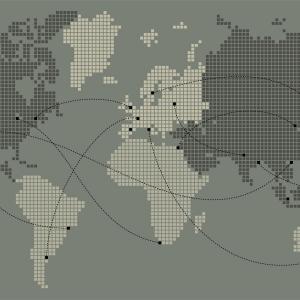
Polly Jones is head of campaigns and policy for Global Justice Now in London.
Posts By This Author
MegaTrade vs. People Who Make Things
New megaregional trade deals are lighting up the global economy- and justice movements for labor rights are mirroring them.

Andrius Repsys / Shutterstock
IN MID-DECEMBER, trade talks involving almost every country in the world closed in Nairobi. Did anyone hear the door slam?
Previous negotiations of the World Trade Organization (WTO) have been sites of furious protest and resistance by tens of thousands of people, including small farmers, trade unionists, anti-globalization activists, and faith and development organizations. (The 1999 negotiations were called the “battle in Seattle” for good reason.)
While the Nairobi meetings held some similarities to previous WTO negotiations—fears that no agreement would be reached and entrenched positions by the global North and South—other aspects were entirely different, including the way civil society is organized for engagement.
In the last two years, we have witnessed the rise of megaregional trade deals. The Transatlantic Trade and Investment Partnership (T-TIP) between the U.S. and the European Union is one example, but there are many others under negotiation. The Comprehensive Economic and Trade Agreement between Canada and the E.U. has been finalized and the text is awaiting parliamentary agreements some time in 2016. The Trans-Pacific Partnership (TPP) between the U.S. and many Pacific Rim countries was agreed upon in October 2015 and is waiting for governments to ratify it. The Trade In Services Agreement is in its 15th round of negotiations involving more than 50 countries.
These deals have many similarities. They are designed to open up new markets for global corporations and create the conditions for them to be as lucrative as possible. Perceived “barriers” to trade, such as fair labor standards, food safety regulations, and publicly provided services, are to be reduced or removed.
Additional legal protections to safeguard corporate profits from the effects of national government policies (such as raising the minimum wage or introducing plain-packaging on tobacco products) will be introduced. And, of course, the negotiations are held in secret, away from democratic scrutiny.